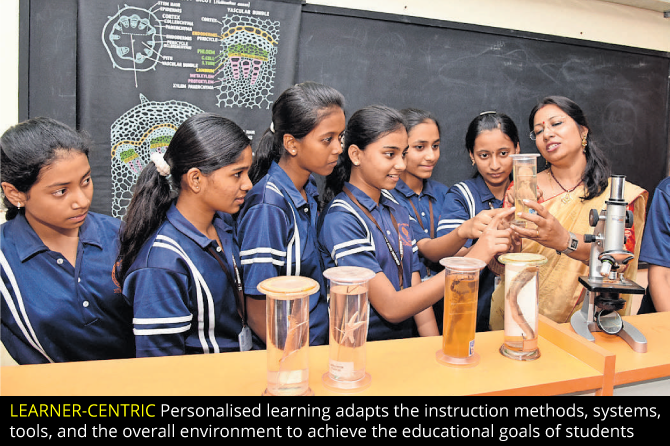Discussing the importance of personalised learning in education and highlights some its benefits.
In my counselling sessions with students, I invariably come across a statement saying, “I am not a Math person.” However, there is no conclusive proof about any genetic predisposition towards excelling in Maths. Hence, we can conclude that learning methods of Mathematics are clearly inadequate for the particular student.
In Ken Robinson’s book, Creative Schools: The Grassroots Revolution That’s Transforming Education, he argues for an end to our outmoded industrial educational system and proposes a highly personalised, organic approach that draws on today’s technological and professional resources to engage students, develop their love of learning, and enable them to face the real challenges of the 21st century.
Children develop and grow up differently, following a general pattern. The brain develops certain abilities like self-motivation, problem-solving and cognitive skills in early years. By the age of five, the brain is fully developed to the extent of about 90%. Therefore, it is important that children experience most appropriate environment in the early years. The learning environment in their formative years usually enables children with social skills to communicate more and be well prepared for schooling.
The way forward
Despite an impetuous growth in the number of institutions, surveys reiterate lack of employable skills signifying that the quality of education hasn’t changed much. We have the largest number of engineers yet India is not yet a top country for technological excellence. In the future, it’s expected that there may be abundance of jobs; but there could be shortage of skills for those jobs. Hence, we need to look at ways which can prevent a lack of skilled professionals.
In such cases, it is the adaptation of personalised learning together with traditional learning that can help. It is the way forward to transform India into a truly knowledge-based economy. The core philosophy of personalised learning recognises that each student differs from the other in terms of intellect, abilities, pace of learning and interests. Personalised learning adapts the instruction methods, systems, tools and the overall environment to reach the educational goals of respective students. For example, students can understand how to develop a video game using Algebra. Similarly, there are other such ways of teaching problem-solving skills that can encourage students to keep practicing them.
How does personalised learning differ from traditional methods of learning? Here are a few ways it does:
- Personalised learning recognises individual needs.
- Students have a greater voice in deciding what and how they want to learn.
- Method of teaching and pedagogy is customised.
- Integrated learning through complementary offline and online sources in a flexible proportion.
- The learning goals don’t change, but the pace of learning could differ.
Some of the benefits include:
- Knowledge and key skills are developed, aligning with the students’ interest.
- Collaborative effort of students and teachers facilitates knowledge and skill building.
- The assessment and evaluation systems are based on individually aligned criteria.
- Greater role of teachers in the development and learning of the student results in job satisfaction.
As a new concept, it has to evolve and transform into a powerful, practical learning philosophy. The philosophy is student-centric, but not without a few challenges:
- Personalised learning demands determination, discipline and greater application of the mind.
- Preparing and managing content, customising offline and online digital content in varying compositions to individual students.
- Time and resources needed to create, manage and administer the learning is enormous and outside the capacity of individual institutions.
With technology in hand
Technology plays a crucial role in personalised learning. Various kinds of technology enables children to have an experiential learning. Websites, software, apps on mobiles, gamification, virtual reality (VR) and other tools that are developed for personalised learning help children understand the concepts in areas such as engineering and architecture. As there’s no limit to learning, there are games for professionals as well to sharpen their work-related skills.
With the help of such tools, preschool children can easily understand and relate to colours, numbers, letters, and basic ideas of Geography and Biology. Also, there’s a variety of interesting subjects for students at the higher levels to explore the huge bank of knowledge in VR such as Chemistry and Physics with virtual laboratories to conduct experiments.
The results saved on the cloud for analysis and review indicates the pace of learning, the extent of learning of every student. With easy access to user-friendly information on the topic of your choice, the world of education has become interesting and learning has become inspiring and exciting.
New face of classrooms
Being conceptually different, the classrooms of personalised learning are different and exciting. The desks could be circular so that students can gather to work on laptops; space for group instruction or one-to-one instruction, couches and bean bags to create a colourful and happy environment. Subjects like Mathematics are taught differently linking the topics with their real-life applications, with a flexible pace of learning. Some lessons could be project based, including fieldwork, to collect data for analysis.
Personalised learning has been gaining ground and becoming popular across the world. Due to the lack of awareness and resources constraints, the take-off has been slow in India. Fortunately, a new wave of Indian entrepreneurs have sensed the opportunity by offering developed syllabus, systems, tools and apps that are usable in both offline and online versions. As a result, these facilitate personalised learning. These options are available more for pre-schooling and early schooling than for higher schools and colleges.
“Children of today are the leaders of tomorrow,” said Nelson Mandela once. The children of today are born with greater intellect with a digital DNA. We must provide an engaging and delightful personalised learning environment and prepare them for tomorrow, refining their interests and intellect. Recognising this, all stakeholders, including the students, teachers, administrators and the government, must support and facilitate a personalised learning.

